- Home
- Elizabeth George
With No One As Witness Page 2
With No One As Witness Read online
Page 2
The other smiled back. “Looks like I’m cruising round for you. Need a lift somewhere?”
It would be convenient, Kimmo thought, if Ronald had seen him take off on the bike and if the cops were quicker to respond than they normally were. He didn’t really want to be out on the street. He still had a couple more miles to go, and it was cold as Antarctica, anyway. He said, “I got the bike with me, though.”
The other chuckled. “Well, that’s no problem if you don’t want it to be.”
CHAPTER ONE
DETECTIVE CONSTABLE BARBARA HAVERS CONSIDERED herself one lucky bird: The drive was empty. She’d elected to do her weekly shop by car rather than on foot, and this was always a risky business in an area of town where anyone fortunate enough to find a parking space near their home clung to it with the devotion of the newly redeemed to the source of his redemption. But knowing she had much to purchase and shuddering at the thought of trudging in the cold back from the local grocery, she’d opted for transport and hoped for the best. So when she pulled up in front of the yellow Edwardian house behind which her tiny bungalow stood, she took the space in the drive without compunction. She listened to the coughing and gagging of her Mini’s engine as she turned it off, and she made her fifteenth mental note of the month to have the car looked at by a mechanic who—one prayed—would not ask an arm, a leg, and one’s firstborn child to repair whatever was causing it to belch like a dyspeptic pensioner.
She climbed out and flipped the seat forward to gather up the first of the plastic carrier bags. She’d linked four of them over her arms and was dragging them out of the car when she heard her name called.
Someone sang it out. “Barbara! Barbara! Look what I’ve found in the cupboard.”
Barbara straightened and glanced in the direction from which the voice had chimed. She saw the young daughter of her neighbour sitting on the weathered wooden bench in front of the ground-floor flat of the old converted building. She’d removed her shoes and was in the process of struggling into a pair of inline skates. Far too large by the look of them, Barbara thought. Hadiyyah was only eight years old and the skates were clearly meant for an adult.
“These’re Mummy’s,” Hadiyyah informed her, as if reading her mind. “I found them in a cupboard, like I said. I’ve never skated on them before. I expect they’re going to be big on me, but I’ve stuffed them with kitchen towels. Dad doesn’t know.”
“About the kitchen towels?”
Hadiyyah giggled. “Not that! He doesn’t know that I’ve found them.”
“Perhaps you’re not meant to be using them.”
“Oh, they weren’t hidden. Just put away. Till Mummy gets home, I expect. She’s in—”
“Canada. Right,” Barbara nodded. “Well, you take care with those. Your dad’s not going to be chuffed if you fall and break your head. D’you have a helmet or something?”
Hadiyyah looked down at her feet—one skated and one socked—and thought about this. “Am I meant to?”
“Safety precaution,” Barbara told her. “A consideration for the street sweepers, as well. Keeps people’s brains off the pavement.”
Hadiyyah rolled her eyes. “I know you’re joking.”
Barbara crossed her heart. “God’s truth. Where’s your dad, anyway? Are you alone today?” She kicked open the picket gate that fronted a path to the house, and she considered whether she ought to talk to Taymullah Azhar once again about leaving his daughter on her own. While it was true that he did it rarely enough, Barbara had told him that she would be pleased to look after Hadiyyah on her own time off if he had students to meet or lab work to supervise at the university. Hadiyyah was remarkably self-sufficient for an eight-year-old, but at the end of the day she was still that: an eight-year-old, and more innocent than her fellows, in part because of a culture that kept her protected and in part because of the desertion of her English mother who had now been “in Canada” for nearly a year.
“He’s gone to buy me a surprise,” Hadiyyah informed her matter-of-factly. “He thinks I don’t know, he thinks I think he’s running an errand, but I know what he’s really doing. It’s ’cause he feels bad and he thinks I feel bad, which I don’t, but he wants to help me feel better anyway. So he said, ‘I’ve an errand to run, kushi,’ and I’m meant to think it’s not about me. Have you done your shopping? C’n I help you, Barbara?”
“More bags in the car if you want to fetch them,” Barbara told her.
Hadiyyah slipped off the bench and—one skate on and one skate off—hopped over to the Mini and pulled out the rest of the bags. Barbara waited at the corner of the house. When Hadiyyah joined her, bobbing up and down on her one skate, Barbara said, “What’s the occasion, then?”
Hadiyyah followed her to the bottom of the property where, under a false acacia tree, Barbara’s bungalow—looking much like a garden shed with delusions of grandeur—snowed flakes of green paint onto a narrow flower bed in need of planting. “Hmm?” Hadiyyah asked. Close up now, Barbara could see that the little girl wore the headphones of a CD player round her neck and the player itself attached to the waistband of her blue jeans. Some unidentifiable music was issuing tinnily from it in a feminine register. Hadiyyah appeared not to notice this.
“The surprise,” Barbara said as she opened the front door of her digs. “You said your dad was out fetching you a surprise.”
“Oh, that.” Hadiyyah clumped into the bungalow and deposited her burdens on the dining table where several days’ post mingled with four copies of the Evening Standard, a basket of dirty laundry, and an empty bag of custard cremes. It all made an unappealing jumble at which the habitually neat little girl frowned meaningfully. “You haven’t sorted out your belongings,” she chided.
“Astute observation,” Barbara murmured. “And the surprise? I know it’s not your birthday.”
Hadiyyah tapped her skate-shod foot against the floor and looked suddenly uncomfortable, a reaction entirely unusual for her. She had, Barbara noted, plaited her own dark hair today. Her parting made a series of zigzags while the red bows at the end of her plaits were lopsided, with one tied a good inch higher than the other. “Well,” she said as Barbara began emptying the first of the carrier bags onto the work top of the kitchen area, “he didn’t exactly say, but I expect it’s ’cause Mrs. Thompson phoned him.”
Barbara recognised the name of Hadiyyah’s teacher. She looked over her shoulder at the little girl and raised a questioning eyebrow.
“See, there was a tea,” Hadiyyah informed her. “Well, not really a tea, but that’s what they called it because if they called it what it really was, everyone would’ve been too embarrassed and no one would’ve gone. And they did want everyone to go.”
“Why? What was it really?”
Hadiyyah turned away and began unloading the carrier bags she’d brought from the Mini. It was, she informed Barbara, more of an event than a tea, or really, more of a meeting than an event. Mrs. Thompson had a lady come to talk to them about their bodies, you see, and all the girls in the class and all their mums came to listen and afterwards they could ask questions and after that they had orange squash and biscuits and cakes. So Mrs. Thompson called it a tea although no one actually drank tea. Hadiyyah, having no mum to take along, had eschewed attending the event altogether. Hence the phone call from Mrs. Thompson to her father because, like she said, everyone was really meant to go.
“Dad said he would’ve gone,” Hadiyyah said. “But that would’ve been excruciating. ’Sides, Meagan Dobson told me what it was all about anyway. Girl stuff. Babies. Boys. Periods.” She pulled a shuddering face. “You know.”
“Ah. Got it.” Barbara could understand how Azhar must have reacted to the phone call from the teacher. No one she had ever met had as much pride as the Pakistani professor who was her neighbour. “Well, kiddo, if you ever need a gal pal to act as a substitute for your mother,” she told Hadiyyah, “I’m happy to oblige.”
“How lovely!” Hadiyyah exclaimed. For a
moment Barbara thought she was referring to her offer as maternal surrogate, but she saw that her little friend was bringing forth a package from within the bag of groceries: Chocotastic Pop-Tarts. “Is this for your breakfast?” Hadiyyah sighed.
“Perfect nutrition for the professional woman on the go,” Barbara told her. “Let it be our little secret, okay? One of many.”
“And what’re these?” Hadiyyah asked as if she hadn’t spoken. “Oh, wonderful. Clotted-cream ice-cream bars! If I was a grown-up, I’d eat just like you.”
“I do like to touch on all the basic food groups,” Barbara told her. “Chocolate, sugar, fat, and tobacco. Have you come across the Players, by the way?”
“You mustn’t keep smoking,” Hadiyyah told her, rustling in one of the bags and bringing out a carton of the cigarettes. “Dad’s trying to stop. Did I tell you? Mummy’ll be so pleased. She asked him and asked him to stop. ‘Hari, it’ll make your lungs all nasty if you don’t quit,’ is what she says. I don’t smoke.”
“I should hope not,” Barbara said.
“Some of the boys do, actually. They stand round down the street from school. These’re the older boys. And they take their shirttails out of their trousers, Barbara. I expect they think it makes them look cool, but I think it makes them look…” She frowned, thoughtful. “…beastly,” she settled on. “Perfectly beastly.”
“Peacocks and their plumes,” Barbara acknowledged.
“Hmm?”
“The male of the species, attracting the female. Otherwise, she’d have nothing to do with him. Interesting, no? Men should be the ones wearing makeup.”
Hadiyyah giggled at this, saying, “Dad would look a sight wearing lipstick, wouldn’t he?”
“He’d be fighting them off with a broomstick.”
“Mummy wouldn’t like that,” Hadiyyah noted. She scooped up four tins of All Day Breakfast—Barbara’s preferred dinner in a pinch after a longer than usual day at work—and carried them over to the cupboard above the sink.
“No. I don’t expect she would,” Barbara agreed. “Hadiyyah, what is that bloody-awful screeching going on round your neck?” She took the tins from the little girl and nodded at her headphones, from which some sort of questionable pop music was continuing to issue.
“Nobanzi,” Hadiyyah said obscurely.
“No-whatie?”
“Nobanzi. They’re brilliant. Look.” From out of her jacket pocket she brought the plastic cover of a CD. On it, three anorexic twentysomethings posed in crop tops the size of Scrooge’s generosity and blue jeans so tight that the only thing left to imagine was how they’d managed to cram themselves into them.
“Ah,” Barbara said. “Role models for our young. Give that over, then. Let’s have a listen.”
Hadiyyah willingly handed over the earphones, which Barbara set on her head. She absently reached for a packet of Players and shook one out despite Hadiyyah’s moue of disapproval. She lit one as what sounded like the chorus to a song—if it could be called that—assailed her eardrums. The Vandellas Nobanzi definitely was not, with or without Martha, Barbara decided. There was a chorus of unintelligible words. Lots of orgasmic groaning in the background appeared to take the place of both the bass line and the drums.
Barbara removed the headphones, and handed them over. She drew in on her fag and speculatively cocked her head at Hadiyyah.
Hadiyyah said, “Aren’t they brilliant?” She took the CD cover and pointed to the girl in the middle, who had dual-colored dreadlocks and a smoking pistol tattooed on her right breast. “This’s Juno. She’s my favourite. She’s got a baby called Nefertiti. Isn’t she lovely?”
“The very word I’d use.” Barbara screwed up the emptied carrier bags and shoved them in the cupboard beneath the sink. She opened her cutlery drawer and found at the back of it a pad of sticky notes that she generally used to remind herself of important upcoming events like Consider Plucking Eyebrows or Clean This Disgusting Toilet. This time, however, she scribbled three words and said to her little friend, “Come with me. It’s time to see to your education,” before grabbing up her shoulder bag and leading her back to the front of the house, where Hadiyyah’s shoes lay beneath the bench in the flagstoned area just outside the door to the ground-floor flat. Barbara told her to put on her shoes while she herself posted the sticky note on the door.
When Hadiyyah was ready, Barbara said, “Follow me. I’ve let your dad know,” and she headed off the property and in the direction of Chalk Farm Road.
“Where’re we going?” Hadiyyah asked. “Are we having an adventure?”
Barbara said, “Let me ask you a question. Nod if any of these names are familiar. Buddy Holly. No? Richie Valens. No? The Big Bopper. No? Elvis. Well, of course. Who wouldn’t know Elvis, but that hardly counts. What about Chuck Berry? Little Richard? Jerry Lee Lewis? ‘Great Balls of Fire.’ Ring any bells? No? Bloody hell, what’re they teaching you at school?”
“You shouldn’t swear,” Hadiyyah said.
On Chalk Farm Road, it was not an overlong walk to their destination: the Virgin Megastore in Camden High Street. To get there, though, they had to negotiate the shopping district, which, as far as Barbara had ever been able to ascertain, was unlike any shopping precinct in the city: packed shopfront to street with young people of every colour, persuasion, and manner of bodily adornment; flooded by a blaring cacophony of music from every direction; scented with everything from patchouli oil to fish and chips. Here shops had mascots crawling up the front of them in the form of super-huge cats, the gigantic bottom of a torso wearing blue jeans, enormous boots, an aeroplane nose down…Only vaguely did the mascots have anything to do with the wares within the individual shops, since most of these were given over to anything black and many things leather. Black leather. Black faux leather. Black faux fur on black faux leather.
Hadiyyah, Barbara saw, was taking everything in with the expression of a novice, the first indication Barbara had that the little girl had never before been to Camden High Street, despite its proximity to their respective homes. Hadiyyah followed along, eyes the size of hubcaps, lips parted, face rapt. Barbara had to steer her in and out of the crowd, one hand on her shoulder, to make sure they didn’t become separated in the crush.
“Brilliant, brilliant,” Hadiyyah breathed, hands clasped to her chest. “Oh, Barbara, this is so much better than a surprise.”
“Glad you like it,” Barbara said.
“Will we go into the shops?”
“When I’ve seen to your education.”
She took her into the megastore, to classic rock ’n’ roll. “This,” Barbara told her, “is music. Now…Where to start you off…? Well, there’s no question, really, is there? Because at the end of the day, we have the Great One and then we have everyone else. So…” She scanned the section for the H’s and then the H’s themselves for the only H that counted. She examined the selections, flipping each over to read the songs while next to her Hadiyyah studied the photos of Buddy Holly on the CD covers.
“Bit odd looking,” she remarked.
“Bite your tongue. Here. This’ll do. It’s got ‘Raining in My Heart,’ which I guarantee will make you swoon and ‘Rave On,’ which’ll make you want to dance on the work top. This, kiddo, is rock ’n’ roll. People’ll be listening to Buddy Holly in one hundred years, I guarantee it. As for Nobuki—”
“Nobanzi,” Hadiyyah corrected her patiently.
“They’ll be gone next week. Gone and forgotten while the Great One will rave on into eternity. This, my girl, is music.”
Hadiyyah looked doubtful. “He wears awfully strange specs,” she noted.
“Well, yeah. But that was the style. He’s been dead forever. Plane crash. Bad weather. Trying to get home to the pregnant wife.” Too young, Barbara thought. Too much in a hurry.
“How sad.” Hadiyyah looked at the photo of Buddy Holly with awakened eyes.
Barbara paid for their purchase and peeled off its wrapper. She brought out the CD and r
eplaced Nobanzi with Buddy Holly. She said, “Feast your ears on this,” and when the music started, she led Hadiyyah back out to the street.
As promised, Barbara took her into several of the shops where the here-today-passé-in-thirty-minutes fashions were crammed onto clothing racks and hung from the walls. Scores of teenagers were spending money as if news of Armageddon had just been broadcast, and there was a sameness to them that caused Barbara to look at her companion and pray Hadiyyah always maintained the air of artlessness that made her such a pleasure to be around. Barbara couldn’t imagine her transformed into a London teenager in a tearing hurry to arrive at adulthood, mobile phone pressed to her ear, lipstick and eye shadow colouring her face, blue jeans sculpting her little arse, and high-heeled boots destroying her feet. And she certainly couldn’t imagine the little girl’s father allowing her out in public so arrayed.
For her part, Hadiyyah took everything in like a child on her first trip to a fun fair, with Buddy Holly raining in her heart. It was only when they’d progressed upwards to Chalk Farm Road, where the crowds were if anything thicker, louder, and more decorated than in the shops below, that Hadiyyah removed her earphones and finally spoke.
“I want to come back here every week from now on,” she announced. “Will you come with me, Barbara? I could save all my money and we could have lunch and then we could go in all of the shops. We can’t today ’cause I ought to be home before Dad gets there. He’ll be cross if he knows where we’ve been.”
“Will he? Why?”
“Oh, ’cause I’m forbidden to come here,” Hadiyyah said pleasantly. “Dad says if he ever saw me out in Camden High Street, he’d wallop me properly till I couldn’t sit down. Your note didn’t say we were coming here, did it?”
Barbara gave an inward curse. She hadn’t considered the ramifications of what she’d intended as only an innocent jaunt to the music shop. She felt for a moment as if she’d corrupted the innocent, but she allowed herself to experience the relief of having written a note to Taymullah Azhar that had employed three words only—“Kiddo’s with me”—along with her signature. Now if she could just depend on Hadiyyah’s discretion…although from the little girl’s excitement—despite her intention of keeping her father in the dark as to her whereabouts while he was on his errand—Barbara had to admit it was highly unlikely that she’d be able to hide from Azhar the pleasure attendant on their adventure.

 Well-Schooled in Murder
Well-Schooled in Murder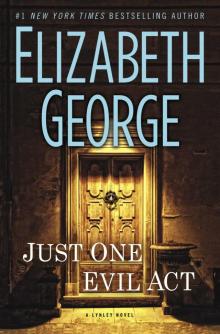 Just One Evil Act
Just One Evil Act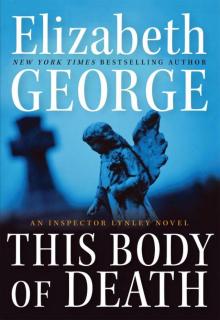 This Body of Death
This Body of Death The Edge of the Water
The Edge of the Water For the Sake of Elena
For the Sake of Elena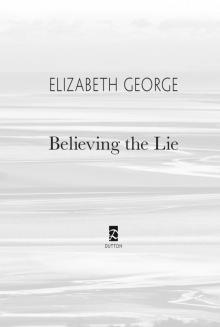 Believing the Lie
Believing the Lie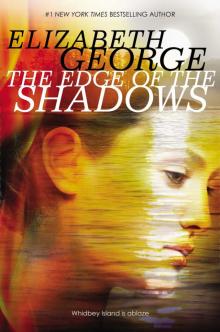 The Edge of the Shadows
The Edge of the Shadows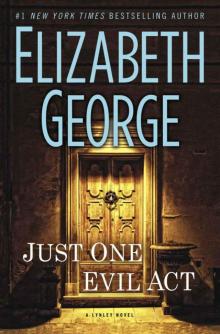 Just One Evil Act: A Lynley Novel
Just One Evil Act: A Lynley Novel In Pursuit of the Proper Sinner
In Pursuit of the Proper Sinner A Moment on the Edge:100 Years of Crime Stories by women
A Moment on the Edge:100 Years of Crime Stories by women Elizabeth I
Elizabeth I I, Richard
I, Richard A Traitor to Memory
A Traitor to Memory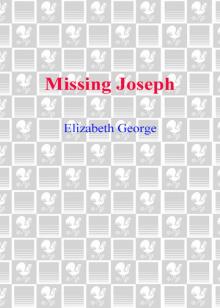 Missing Joseph
Missing Joseph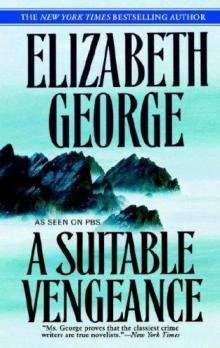 A Suitable Vengeance
A Suitable Vengeance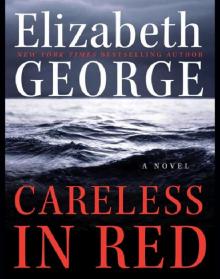 Careless in Red
Careless in Red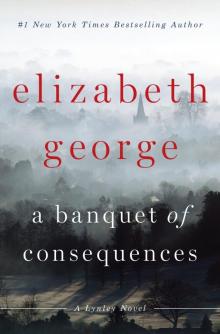 A Banquet of Consequences
A Banquet of Consequences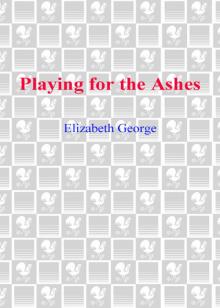 Playing for the Ashes
Playing for the Ashes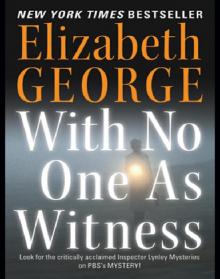 With No One As Witness
With No One As Witness Deception on His Mind
Deception on His Mind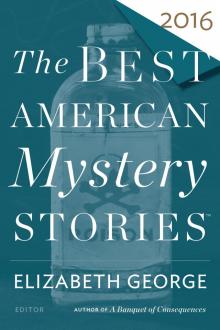 The Best American Mystery Stories 2016
The Best American Mystery Stories 2016 A Great Deliverance
A Great Deliverance In the Presence of the Enemy
In the Presence of the Enemy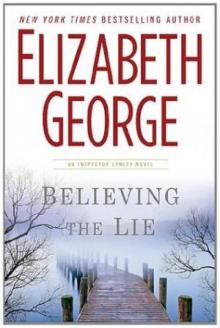 Believing the Lie il-17
Believing the Lie il-17 The Edge of the Light
The Edge of the Light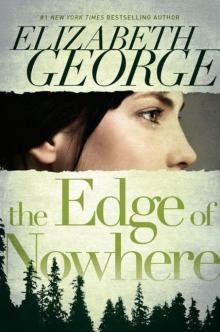 SW01 - The Edge of Nowhere
SW01 - The Edge of Nowhere A Place of Hiding
A Place of Hiding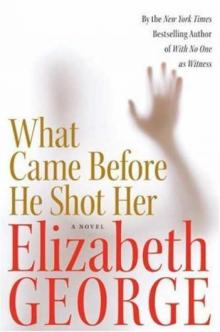 What Came Before He Shot Her il-14
What Came Before He Shot Her il-14 Payment In Blood
Payment In Blood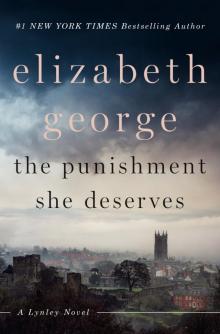 The Punishment She Deserves
The Punishment She Deserves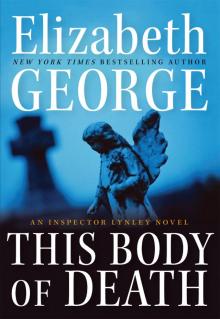 This Body of Death: An Inspector Lynley Novel
This Body of Death: An Inspector Lynley Novel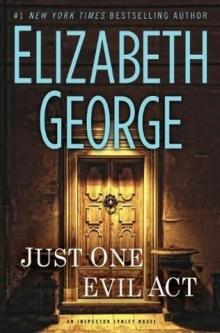 Just One Evil Act il-18
Just One Evil Act il-18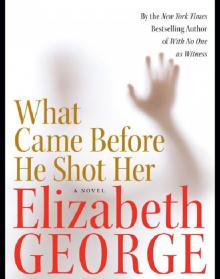 What Came Before He Shot Her
What Came Before He Shot Her Missing Joseph il-6
Missing Joseph il-6